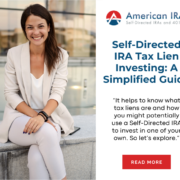Tax Lien Investing in a Self-Directed IRA
Tax Lien Investing in a Self-Directed IRA
Tax liens. For most people, those two words are scary. But there’s another side of tax liens that can potentially create reliable income. This is beneficial to a retirement investor who wants to invest those tax liens within a Self-Directed IRA. By investing in tax liens, an investor can take over the lien. This means they acquire the debt for the potential to create that reliable income. In many cases, there are added benefits to investing this way. This includes the possibility of foreclosure and taking the property into the IRA itself. Here’s what you’ll need to know about this unique way of investing.
If you want to expand your retirement investing horizons:
How to Invest in Tax Liens in a Self-Directed IRA
First, let’s get started with the mechanics of tax lien investing in an IRA. Note: if you want to follow along, check out our dedicated page on tax lien investing here.
Taking over a tax lien and collecting on the debt owed to that asset means investors can see high interest rates on the debt. The interest rates you can charge are often limited by the state under whose jurisdiction you’re operating. In many cases, interest rates can be as high as 18% or more. In the case of foreclosure, you can then decide whether you want to sell the property or keep it in the IRA and generate a profit by renting it out through the Self-Directed IRA.
Why Tax Liens?
Investing in tax liens can be a great way to diversify your retirement portfolio and take advantage of potential returns. With a Self-Directed IRA, investors now have the opportunity to purchase tax liens backed by federal and state governments. This type of investment offers a guaranteed rate of return with minimal risk, making it an appealing vehicle for retirement savings.
Tax liens are essentially claims on the property or assets of delinquent taxpayers who have failed to pay their local or state taxes. When investors purchase these liens, they become creditors of the taxpayer and have rights to the property until their claims are paid off. Liens are typically sold at public auctions, with interest rates varying depending on year issued, location, and type of tax lien certificate.
Investing in tax liens through a Self-Directed IRA offers several advantages compared to typical stock investments. Tax lien certificates offer secure returns that are generally high—upwards of 18%—and better than those found in stocks or bonds in most cases. There is also more limited volatility due to their status as secured debt instruments (i.e., they remain attached to property). This can provide valuable stability for investors looking for investment options less correlated with the markets overall movements. Additionally, investing in tax liens can be done via traditional methods such as physically attending auctions or purchasing them over an online marketplace—allowing investors to pick up deals quickly when opportunities arise.
What are the Limits of Tax Lien Investing in an IRA?
It is important to remember that there are limitations when it comes to investing in tax liens. Due to IRS rules and regulations regarding Self-Directed IRAs, you must be mindful with your Self-Directed IRA. These restrictions include prohibitions against investing directly into entities where you may have an affiliation. The IRS also prohibits against any investing activity deemed as self-dealing or deemed as providing personal benefit from such activities (e.g., no renting out the property to someone you know). It is important for investors considering this option familiarize themselves with all relevant IRS laws. Especially prior to making any decisions related to utilizing a Self-Directed IRA account for tax lien investments. This will help you avoid any penalties or legal ramifications down the line which could impact one’s retirement savings significantly.
Interested in learning more about Self-Directed IRAs? Contact American IRA, LLC at 866-7500-IRA (472) for a free consultation. Download our free guides or visit us online at www.AmericanIRA.com.






